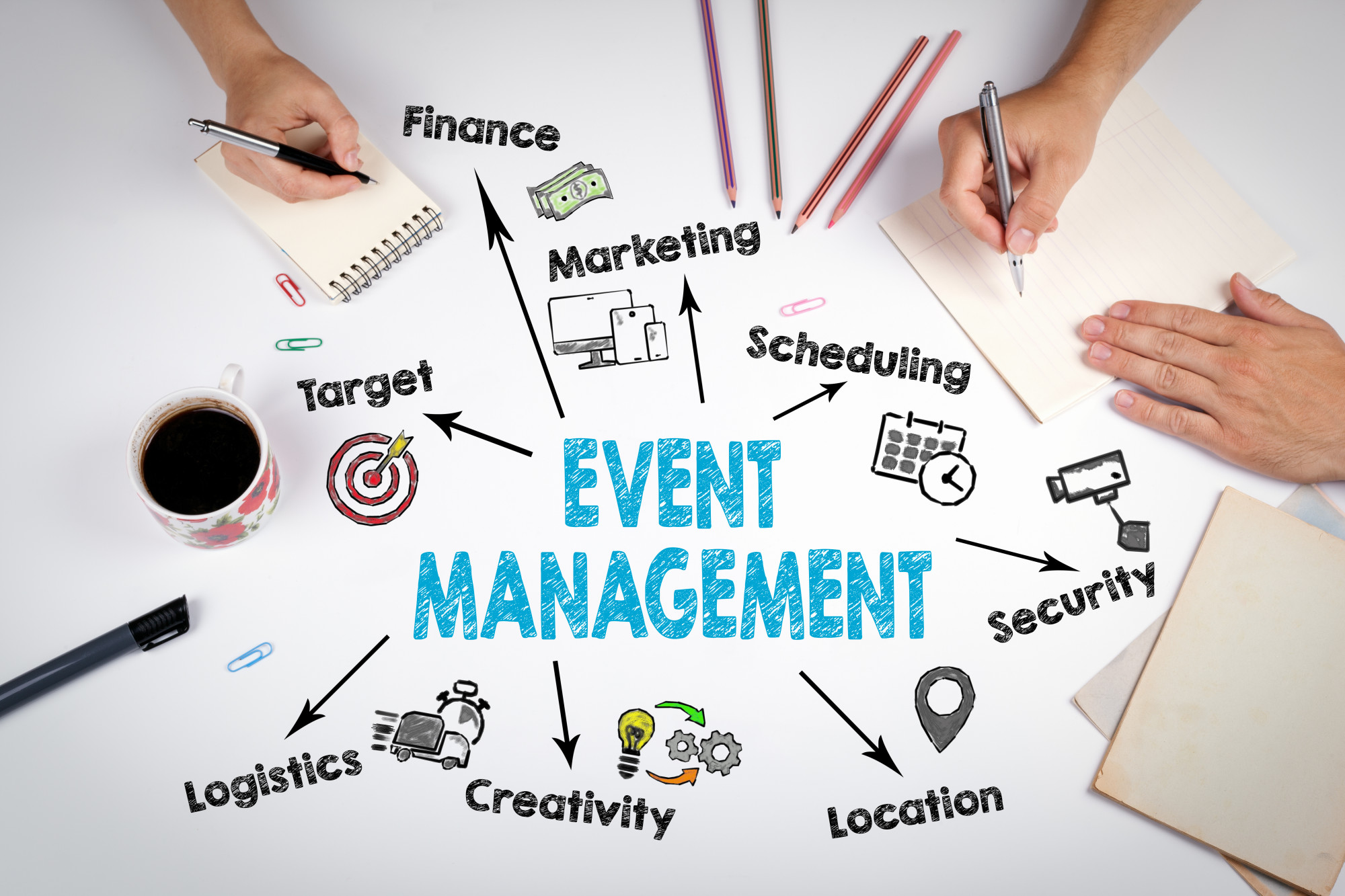The role of charlotte event companies in corporate conferences
Wiki Article
A Deep Dive Into Just How Event Management Works to Create Unforgettable Experiences
Event management is a complicated self-control that incorporates numerous components to craft remarkable experiences. It needs a clear understanding of the event's purpose and target market. Organizers have to navigate budgeting, logistics, and advertising to guarantee a smooth execution. Each element plays an important duty in achieving the preferred impact. Nevertheless, the trip does not finish with the event itself. There are insights to uncover that can shape future undertakings.The Fundamentals of Event Management
Reliable event management encompasses a variety of important concepts that guide the preparation and execution of effective occasions. At its core, it includes recognizing the event's purpose, target market, and wanted outcomes. Determining the target group is crucial, as it notifies decisions associated with material, advertising and marketing, and logistics.Budgeting is one more basic facet, guaranteeing that resources are assigned effectively while fulfilling the event's purposes. This includes planning for unexpected costs that might arise.
Time management plays an important role, as event managers should establish an in-depth timeline to collaborate various tasks and landmarks.
Additionally, effective communication among stakeholders, vendors, and employee is important to guarantee alignment and stay clear of misunderstandings.
Risk management must be taken into consideration, with backup plans in area to attend to prospective challenges, therefore boosting the general experience for attendees and assuring a seamless execution of the event.
Secret Functions in Event Preparation
In event preparation, understanding vital functions is important for effective execution. The event planner is liable for managing logistics and ensuring all facets align with the vision. Additionally, effective supplier management is crucial for maintaining top quality and cultivating strong collaborations throughout the planning process.Event Coordinator Duties
An occasion planner coordinates the complicated components of event preparation, making certain smooth execution from fertilization to final thought. They are liable for conceptualizing the event theme, establishing budget plans, and creating timelines to keep the job on track. Coordination with stakeholders, including clients, venue supervisors, and volunteers, is necessary to align expectations and facilitate communication. The organizer additionally oversees logistics, such as food catering, transport, and technology needs, making certain all elements operate harmoniously. They carry out site brows through, manage schedules, and troubleshoot problems that may develop throughout the event. Post-event, the coordinator examines the event's success, collecting responses and assessing end results to educate future projects. This multifaceted role needs strong organizational abilities, attention to detail, and efficient interpersonal communication.Vendor Management Basics
Steering through the landscape of supplier management is crucial for effective event preparation. Reliable supplier management includes determining, choosing, and collaborating providers that provide critical services, such as event catering, audiovisual support, and decoration. Event planners must maintain solid interaction with vendors to ensure that all elements align with the event's vision. Secret duties consist of the vendor manager, who looks after agreements and arrangements, and the logistics organizer, in charge of on-site configuration and execution. It's important to establish clear expectations and timelines, fostering a joint setting that enhances the overall experience. By focusing on these aspects, event planners can browse prospective challenges, ensuring that every detail adds to a seamless and remarkable event.Crafting a Vision: Principle Development

As soon as a vision is developed, it comes to be important to convert it right into workable components. This includes defining the atmosphere, choosing ideal venues, and determining the event's design. Collaborating with stakeholders, including sponsors and partners, additionally improves the concept, guaranteeing that all celebrations share a linked understanding of the event's purpose. Ultimately, a well-developed vision not just boosts attendee engagement however likewise establishes the phase for remarkable experiences that reverberate long after the event ends.
Budgeting and Source Allocation
With a clear vision in location, the following action in event management involves careful budgeting and resource allotment. This important stage warranties that all essential parts are moneyed and lined up with the event's purposes. Event managers start by estimating my explanation prices connected with place option, event catering, home entertainment, and advertising. They produce an in-depth spending plan that lays out each category, enabling for transparency and accountability.Resource appropriation expands past funds; it additionally incorporates human sources. Determining team duties, obligations, and timelines is important to ensure efficiency. Event supervisors must also take into consideration backups for unexpected expenses or adjustments in range, developing a barrier within the budget.
Furthermore, prioritizing spending on elements that boost visitor experiences is important. By tactically allocating sources, event managers take full advantage of impact while keeping financial control. This self-displined method not just fosters effective events however also constructs integrity and trust with stakeholders and individuals.
Logistics: The Backbone of Event Execution
While budgeting prepares for an event, logistics act as its backbone, ensuring that every aspect is executed efficiently and successfully. charlotte event companies. This encompasses a vast range of tasks, consisting of location selection, transportation plans, and tools procurement. Reliable logistics management calls for precise planning and sychronisation to ensure that all components straighten with the event's timeline and purposesSecret elements of logistics include inventory management, where products and products are tracked to stop shortages, and staffing, which includes recruiting and training workers to manage numerous tasks. Interaction is likewise essential, as it assists in cooperation among vendors, sponsors, and the event team.

Advertising And Marketing and Promotion Techniques
Reliable advertising and marketing and promotion strategies are essential for making the most of participation and involvement at an occasion, as they generate passion and exhilaration among prospective individuals. Event managers utilize a mix of typical and digital marketing strategies to reach their target audience. Social media site platforms, e-mail campaigns, and targeted advertisements are commonly used to create buzz and foster community communication. Cooperations with influencers or industry leaders can enhance reliability, while engaging web top article content such as videos and endorsements can reverberate with possible attendees.Additionally, leveraging event-specific hashtags and producing shareable graphics motivates natural promo amongst participants. Early bird ticket offers and exclusive promotions can incentivize enrollment, furthermore improving interest. Moreover, a properly designed website that provides easy navigating and clear information about the event can boost the customer experience. By executing these marketing and promotion approaches, event supervisors can ensure higher exposure and inevitably develop a remarkable experience for all participants.

Determining Success: Feedback and Evaluation
Success in event management rests on robust comments and examination devices. These processes are important for figuring out the efficiency of an event and recognizing areas for renovation. By gathering input from guests, coordinators can analyze complete satisfaction levels, recognize choices, and determine general impact. Studies and interviews function as beneficial tools for collecting measurable and qualitative information, permitting comprehensive evaluation.Additionally, reviewing crucial performance indications (KPIs) such as attendance rates, interaction levels, and return on investment (ROI) supplies a more clear photo of event success. Post-event debriefing sessions with the preparation team additionally add understandings, cultivating a society of continual improvement.
Eventually, a methodical strategy to feedback and analysis not only enhances future occasions but also strengthens partnerships with stakeholders. By executing these methods, event managers can produce unforgettable experiences that reverberate with participants and drive recurring involvement.
Frequently Asked Concerns
Exactly How Do Event Managers Take Care Of Unexpected Challenges Throughout an Event?
Event managers resolve unanticipated difficulties by staying tranquility, reviewing the situation, and implementing contingency strategies - charlotte event companies. They communicate this website efficiently with their group, adapt promptly, and prioritize options to assure the event proceeds efficiently and effectivelyWhat Innovation Devices Are Essential for Modern Event Management?
Vital innovation tools for modern event management include event enrollment software program, task management applications, guest interaction platforms, and analytics devices. These sources simplify procedures, improve communication, and boost total event experiences for organizers and participants alike.Just How Do Cultural Differences Influence Event Preparation and Execution?
Social differences greatly affect event planning and execution. They influence themes, customizeds, interaction designs, and assumptions, demanding customized techniques to guarantee inclusivity and regard, inevitably shaping the total experience and success of the event.What Are the Ethical Factors To Consider in Event Management?
Ethical considerations in event management include openness, sustainability, cultural sensitivity, and inclusivity. Planners must prioritize fairness, respect diverse target markets, lessen environmental influence, and assurance accessibility to develop responsible and unforgettable experiences for all participants.Exactly How Can Sustainability Be Integrated Into Event Preparation?
Sustainability can be integrated into event preparation by using environment-friendly materials, reducing waste, sourcing local vendors, applying carbon offset programs, and promoting electronic solutions to minimize paper use, consequently enhancing environmental awareness within the event's structure.Report this wiki page